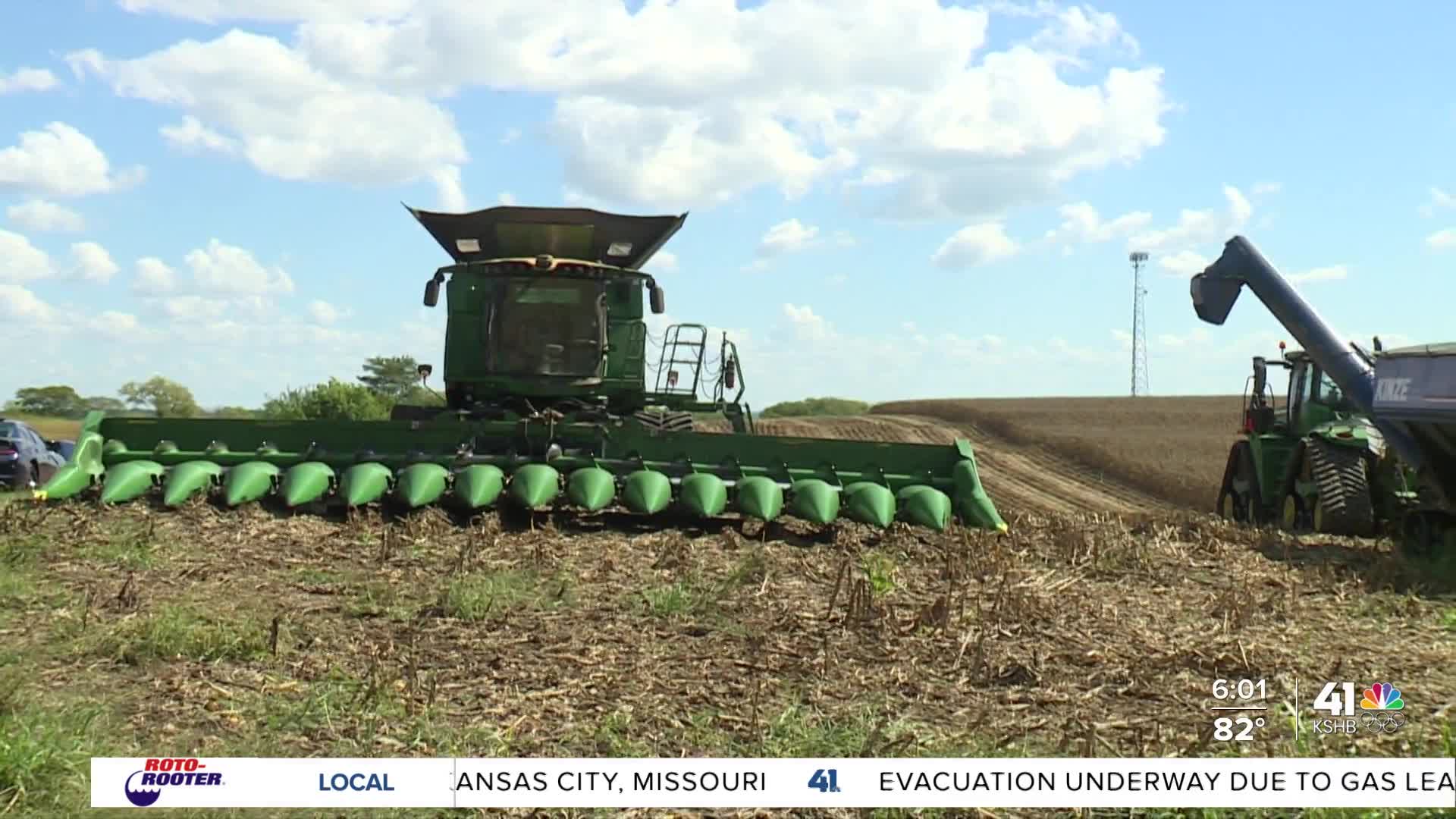KSHB 41 reporter Ryan Gamboa covers Miami County in Kansas and Cass County in Missouri. He also covers agricultural topics. Share your story idea with Ryan.
USDA Secretary Brooke Rollins made her third visit to Missouri since she took the helm of the Department of Agriculture. It's her most-visited state since she took her role in the office.
The Ag Outlook Forum event on Thursday, hosted by the Agricultural Business Council of Kansas City, brought in several speakers and hundreds of agricultural leaders and producers.
"My friends, we know that agriculture in our country today is under threat," Rollins said during her speech.

She outlined multiple priorities from the USDA: financial relief delivery, driving down high production costs, labor, bio-security research and trade.
"I know that right now, today, we have yet to see a marked difference [in the trade war], but by next year, we believe so sincerely, and in my meetings with buyers overseas, the future could not be brighter," Rollins said.
Secretary Rollins visited Richardson Farms in Platte County on Thursday. The row crop, livestock, and direct-to-consumer beef producers have been in the agriculture industry for five generations.

Richardson told KSHB 41 News reporter Ryan Gamboa that trade markets are at the top of his mind.
"I said this five years ago, I’m no guru on marketing, but I said, 'We had too many eggs in one basket with China,"' he said. "We've been selling all those beans to them. 10 years ago, we should’ve been looking for another market."
During Thursday's meeting with the press at the Ag Outlook Forum, Sec. Rollins said there are significant dynamics when negotiating trade deals.

"The long-term vision, we have to get these markets open," she said. "We have to stop relying on one country as our largest buyer," she said.
According to a New York Times report, China bought $12.6 billion in U.S. soybeans last year. China has stopped buying since retaliatory tariffs were imposed on the country in May.

Soybeans are being harvested in Missouri right now. Agriculture experts are looking for answers so growers can reap the benefits of the trade wars.
"China is a critical trade partner. They’re also really difficult when it comes to trade negotiations," said Garrett Hawkins, president of the Missouri Farm Bureau. "We’ve seen through the years where American agriculture is used time and time again when it comes to trade negotiations. Because they know if they strike American agriculture, they’re going to see progress."

Sec. Rollins says she trusts the trade tactics set by President Trump.
"That's a country that isn't aligned with our values," Rollins said. "We are now at a place as a country, we’re relying on other countries to feed ourselves and relying on other countries in a way that is detrimental to the guys standing behind me."
While Hawkins also touts the administration's efforts to clear trade roadblocks, he isn't naive.
Issues in the marketplace are leading to challenging times.

"I am not saying it isn’t a difficult time right now," he said. "We need to see more progress as soon as possible."
Sec. Rollins told agriculture producers the administration has worked on new trade agreements in the Philippines, Indonesia, Japan, the United Kingdom, and with the European Union. Those trade agreements primarily focus on commodities other than soybeans — dairy, ethanol, rice, and beef.
"I don't want to get too political," Richardson said. "But the last administration didn't do too much for trade. I don't understand how we can import Australian beef here, but they don't take any in return, and we have better quality."
Since 2003, Australia has restricted U.S. beef imports out of concern about mad cow disease. Australian-raised and slaughtered livestock have been allowed in the United States since 2019.

While the soybean harvest is underway in the U.S., Sec. Rollins asks farmers to hold off, as trade war relief for major players like China should last another year.

"The best really is yet to come," she said.
Rollins went on to add that with her close working relationship with President Trump, the president is willing to step in and fill the gap if necessary during the waiting period.
"I think we're at the point where we all agree, we're at necessary," added Rollins.

The Kansas Farmers Union told KSHB 41 that farmers don't have a year to wait with the farm economy struggling.
“Farm bankruptcies are up 95% in the first quarter of 2025 compared to last year. Since 2022, corn prices are down 50% and soybean prices are down 40% while production costs are up nearly 50% in the past decade, with phosphates up 60%. Agricultural imports are projected to exceed exports by $47 billion in 2025 – the largest deficit in history. Farmers are on the brink of collapse, and this administration says, ‘Just give it time.’ Farmers don’t have time to wait. Farmers need action from The White House, USDA, U.S. Trade Representative’s Office, and from Congress. Farmers need a new Farm Bill, new markets and trade policies that actually work, and enforcement of antitrust laws to break up corporate monopolies. Time is not on our side, but it is definitely of the essence.”
Uncertainty in the marketplace is why Richardson is hanging on to this year's corn crop.
"Why do I want to sell that corn crop right now, below the cost of production?" Richardson asked.

There is the same concern for low corn market prices.
What comes next?
"I’d just like corn to go up 80, beans to go up two bucks, everything would be a lot less stressful," Richardson said. "Things would be a lot better."
—
KSHB 41 reporter Ryan Gamboa covers Miami County in Kansas and Cass County in Missouri. He also covers agricultural topics. Share your story idea with Ryan.




